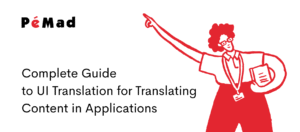Have you ever encountered a situation where language differences hindered communication? For example, when attending an international conference, engaging in business negotiations, or consulting with a foreign doctor? This is where the role of an interpreter becomes crucial, as they act as a bridge, ensuring smooth communication without misunderstandings.
An interpreter is not merely translating word for word but also conveying the meaning accurately, in context, and culturally. It’s no surprise that this profession is increasingly in demand across various sectors, from business to healthcare. In fact, according to The Business Research Company, the interpretation services industry is valued at over $11 billion in 2024 and continues to grow as the need for cross-lingual communication rises.
Furthermore, what types of interpreters are available, and what skills must they master? Let’s explore further!
Content :
ToggleTypes of Interpreters and Their Expertise
In cross-lingual communication, the role of an interpreter is vital. However, not all interpreters have the same expertise. Each type has its own specialization, depending on the context in which it’s used. Below are various interpreter roles and the essential skills they require:
1. Simultaneous Interpreter
A simultaneous interpreter is responsible for translating in real-time as the speaker talks, without any pauses. This interpreter type is often engaged for major gatherings like global conferences, international symposiums, or cross-national corporate meetings. To perform this task, a simultaneous interpreter must have the following skills:
- High concentration to listen and interpret simultaneously.
- Proficient knowledge of both the source and target languages.
- Quick processing of information and accurate delivery.
Simultaneous interpreters generally operate from sound-isolated booths using specialized audio systems that allow them to translate speech in real time. This system is crucial in international events, such as ASEAN and G20 summits, where seamless cross-lingual communication is essential.
2. Consecutive Interpreter
Unlike simultaneous interpreters, consecutive interpreters provide translations after the speaker has finished one or more sentences. This technique is more commonly used in business meetings, interviews, or court hearings that require deeper, two-way communication. To perform effectively, a consecutive interpreter should demonstrate:
- Proficient active listening and the ability to take notes on essential details.
- Deep proficiency in both the original and intended languages.
- Clear communication skills to accurately relay the intended message.
This method allows the interpreter more time to process information, ensuring more precise translations before presenting them to the audience.
3. Business Interpreter
A business interpreter specializes in business terminology and concepts. Business interpreters are frequently tasked with translating during corporate meetings, negotiations, product launches, or international collaborations. Besides being fluent in languages, a business interpreter needs to have a solid understanding of the business environment:
- A deep knowledge of business terminology and corporate culture.
- The ability to maintain confidentiality, especially when dealing with strategic documents and discussions.
- Strong interpersonal skills to facilitate effective communication between involved parties.
4. Medical Interpreter
In healthcare environments, interpreters assist in bridging the language gap between medical staff and patients. They typically work in hospitals, clinics, or other care facilities to explain diagnoses, medical procedures, and treatment plans. Key competencies for medical interpreters include:
- Comprehensive knowledge of medical terminology and practices.
- Cultural competence and an understanding of ethical considerations in healthcare settings.
- Strict adherence to patient confidentiality, following applicable privacy standards.
5. Legal Interpreter
Legal interpreters play a vital role in the justice system by enabling effective communication during courtroom sessions and other legal processes. They translate communication in legal contexts, such as courtrooms, investigative processes, or meetings with attorneys. Legal interpreters must have the following skills:
- A deep understanding of legal frameworks and the terminology involved in both working languages, along with the capacity to stay neutral, particularly in high-stress or emotional contexts.
- The ability to remain neutral and impartial, especially in emotional or tense situations.
- An awareness of the critical importance of accuracy and confidentiality, as small mistakes can significantly affect legal proceedings.
6. Telephone and Video Interpreter
Modern technology has enabled interpreters to provide services remotely, using video conferencing or telephone connections. This type of interpretation is widely used in international customer service, remote medical consultations, or virtual business meetings. Since face-to-face communication is not possible, telephone and video interpreters must possess:
- Interpreters must be comfortable using digital tools and remote communication platforms to adapt to virtual interpretation environments.
- Strong listening and speaking skills to overcome non-verbal communication limitations.
- Flexibility in handling various dialects and accents that may arise during remote communication.
A stable internet connection and proper communication equipment are crucial for the success of this type of interpretation.
Core Skills Required of an Interpreter
Being an interpreter requires more than just fluency in multiple languages. This profession demands specialized skills to ensure that the translated message is accurate, effective, and contextually appropriate. Here are some essential skills interpreters must possess to perform their duties optimally:
1. Deep Language Proficiency
An interpreter must have an excellent command of the language, including vocabulary, grammar, idiomatic expressions, and various dialectical variations. Proficiency in both the source and target languages is necessary to ensure the interpretation conveys the intended meaning rather than just a word-for-word translation.
2. Strong Cultural Understanding
Language and culture are inseparable. To avoid misunderstandings, an interpreter must understand the cultural values, customs, and social norms associated with the language being interpreted. For instance, some phrases in one language might convey entirely different meanings when interpreted within another cultural context. Without understanding the cultural context, the message could change or even offend the audience.
3. Sharp Listening Skills
An interpreter must possess the ability to absorb messages quickly and accurately. This ability entails more than just hearing the words—it requires interpreting the speaker’s tone, inflection, and the overall context of the dialogue.
4. High Concentration and Discipline
The interpreter profession often involves working under pressure, such as during international conferences or long business negotiations. High concentration is essential to maintain accuracy in translation without losing focus. Upholding professionalism and being punctual are also of great importance.
5. Certification and Professional Training
To enhance credibility and expertise, an interpreter should have certification from a recognized institution, such as translation associations or specialized educational programs. This professional training ensures that an interpreter meets the required competence standards, both technically and ethically.
Factors to Consider Before Booking an Interpreter
Choosing the right interpreter is crucial to ensure smooth communication, particularly when different languages are involved. Before booking an interpreter, here are some key factors to consider:
1. Language and Dialect Requirements
The first thing to confirm is whether the interpreter is proficient in the required language and dialect. Some languages have significant dialect variations, and selecting an interpreter with expertise in the specific dialect can prevent misunderstandings. Ensure the interpreter is fluent in the language that matches your needs.
2. Experience and Specialization
Experience is another important factor. Select an interpreter whose expertise and experience align with your event’s needs. For example, if you’re hosting a seminar on legal matters, an interpreter familiar with legal terminology will be far more beneficial than a general interpreter. Specialized expertise ensures better quality translations and communication.
3. Duration and Location of Service
Consider how long the event will last and where it will be held. Make sure the interpreter is available for the entire duration of the event and can be present at the specified location. Some interpreters may have time constraints or geographic limitations, so it’s important to verify their availability beforehand.
4. Availability of Supporting Equipment
If the event requires additional equipment such as headsets or audio systems, make sure the interpreter or service provider can supply these. Proper equipment is essential for maintaining clear communication, particularly during large-scale events or in wide-open venues.
5. Cost and Budget
Make sure the interpreter you hire fits within your financial plan. While quality is the top priority, it’s also important to ensure the interpreter’s fees are within your financial range. Discuss rates and cost details upfront to avoid hidden charges or surprises at the time of payment.
Get a Free Consultation with PéMad to Help You Choose the Ideal Interpreter!
Finding the right interpreter is key to successful communication in any meeting or event. With various types of interpreters available, it’s important to select the one that fits your specific needs.
PéMad offers free consultation services to help determine the most suitable interpreter. Our team is ready to provide recommendations based on your event requirements, ensuring you select the right interpreter for your language, topic, and context.
Feel free to reach out for a complimentary consultation. Ensure your event runs flawlessly with the help of PéMad’s professional interpreters—get in touch with us now to learn more!
References
- American Translators Association. Hiring an Interpreter? 9 Dos and Don’ts to Get the Most Out of Your Partnership. Retrieved from
https://www.atanet.org/client-assistance/hiring-an-interpreter-9-dos-and-donts-to-get-the-most-out-of-your-partnership/ - The Business Research Company. Language Service Global Market Report. Retrieved from
https://www.thebusinessresearchcompany.com/report/language-services-global-market-report - Cultural Health Center. Booking and briefing an interpreter. Retrieved from https://www.ceh.org.au/resource-hub/booking-and-briefing-an-interpreter/
- Translation & Interpreting. Types of Interpreting Explained (Simultaneous, Consecutive, etc.). Retrieved from
https://translationandinterpreting.com/types-of-interpreting/ - American Translators Association. Consecutive vs. Simultaneous Interpreting: What’s the Difference? Retrieved from
https://www.atanet.org/client-assistance/consecutive-vs-simultaneous-interpreting-whats-the-difference/
- American Translators Association. Hiring an Interpreter? 9 Dos and Don’ts to Get the Most Out of Your Partnership. Retrieved from









